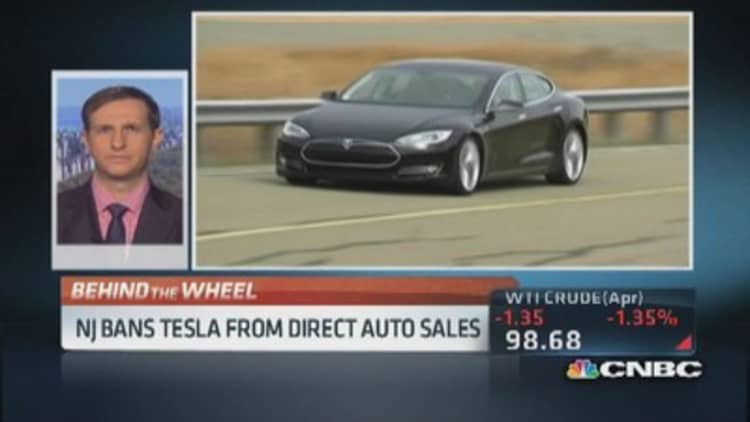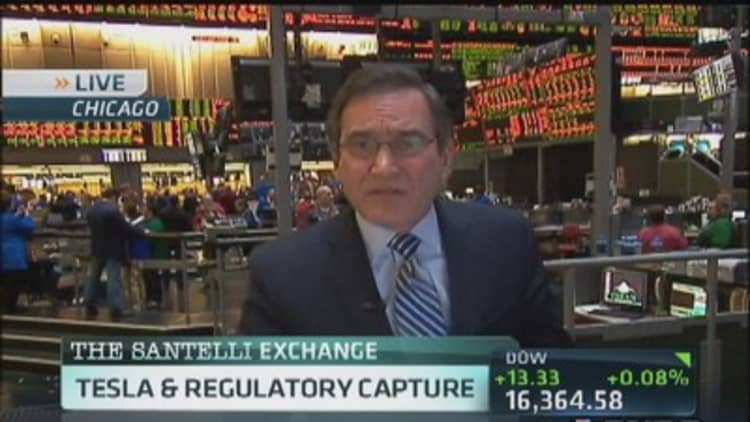
Depending upon your point of view, Tesla Motors is either at the forefront of an automotive retail revolution, or is simply trying to cut out the middleman to fatten its own bottom line.
New Jersey on Tuesday became the third state to ban the company from selling vehicles directly to the public, following Arizona and Texas, in a move meant to preserve the well-entrenched dealer franchise system that has been around almost as long as the auto industry itself.
For the moment, at least, it means that New Jersey residents will have to head across state borders if they want to buy one of the environmentally friendly Tesla Model S sedans.
But the dispute is far from over.
"It seems like Chris Christie is intent on driving traffic into New York with this decision," Northland Capital Markets senior analyst Colin Rusch told CNBC. "We're going to see folks coming into Pennsylvania or into New York."
(Read more: NJ bans direct auto sales; Tesla slips)
Automotive dealer groups continue pressing for bans on Tesla's retail model in New York and a number of other states. The California-based maker has gotten its way in a few states and reached compromise agreements in others, including Colorado, where it has been allowed to retain several company-owned stores but can't open any others.
Over the years, the courts have routinely supported the dealer system and its major advocate, the National Automobile Dealers Association. But few expect Tesla and its brash and determined founder and CEO Elon Musk to roll over.
"This is just a teething exercise right now," said Rusch, who has a $252 price target on the automaker. "It will certainly escalate the debate."
More from The Detroit Bureau:
US Justice Dept. launches investigation of GM switch recall
Average American can no longer afford average-price vehicles
Bankruptcy could once again save GM from switch recall lawsuits
The latest flap was touched off on Tuesday when New Jersey Gov. Chris Christie's administration ruled in favor of a state requirement that new cars must be sold through licensed franchises. The rule had been proposed by the New Jersey Motor Vehicle Commission in October, about the time Tesla opened two of its own stores in the state.
The announcement triggered a testy response from Tesla, which accused the governor's office of having "gone back on its word" to find a compromise that would allow the carmaker to operate in the state. Tesla believes it will now have to shutter its New Jersey outlets or sell them to private franchisees.
"Having previously issued two dealer licenses to Tesla, this regulation would be a complete reversal to the long-standing position of [New Jersey Motor Vehicle Commission] on Tesla's stores," Tesla said on its blog, adding its frustration that the issue is about more than "just Tesla customers, but also New Jersey citizens at large."
(Read more: Tesla soars, Ford falls in 'Consumer Reports' study)
Rusch said it's a "complete misnomer" to say the ban is in the best interest of consumers, as the dealer model increases the margins consumers pay for vehicles as well as the time it takes to buy a vehicle.
"[It] doesn't add any sort of increased service for consumers," he said.
Considering Tesla was initially planning just two stores in New Jersey, the news might not be a major inconvenience for potential buyers, especially those in the Greater New York or Philadelphia areas. Instead of going to the suburbs of Short Hills or Paramus, those on the north side of the Garden State can quickly access a number of showrooms in or near the Big Apple. At the other end of the state there's a Tesla retail outlet in the Philadelphia area's King of Prussia Mall.
Registration and tax issues can be a minor headache, but it's been common for years for consumers to shop across state lines if they can get better deals.
Tesla is far from the only automaker to have been frustrated over the years by the well-established franchise system. Ford Motor, for one, tried a number of alternatives around the beginning of the new millennium, including setting up factory-owned stores and exploring operations for direct online sales. The maker was ultimately forced to retreat due to established regulations as well as pressure from its existing retailers.
(Read more: Texas auto dealers—no special treatment for Tesla)

"Dealers are very firmly entrenched" and not very open to change, cautioned Stephanie Brinley, a senior analyst with consulting firm IHS Automotive. Brinley said dealers have built grass-roots support in local communities and collectively have become one of the strongest political lobbying forces in the country.
That's not to say change can't or won't happen.
A decade ago, it was the auto industry that attempted to block the emergence of corporate dealer chains like AutoNation and Asbury Automotive Group. They've since become an established part of the system. And while you can't buy a new car online like you might a TV, books or CDs, studies by J.D. Power and Associates show that nearly 9 in 10 shoppers now do much of their preliminary research on the Internet.
But that isn't likely to satisfy Tesla. The maker's blog post lamented "it is vital to introduce our own vehicles to the market because electric cars are still a relatively new technology."
It's probably a good time for the maker to be battling the system, Brinley said. Right now, she notes, Tesla has more demand than it can supply. But that could change as it expands its capacity and adds two more product lines: the Model X battery crossover and the more affordable Model E, expected in 2015.
"It's difficult to predict how it will turn out," Brinley said, but it's likely "Tesla will win a few and lose a few," and ultimately reach compromise in states that won't budge on their franchise laws.
—By CNBC Contributor Paul A. Eisenstein. Follow him on Twitter @DetroitBureau or at thedetroitbureau.com. CNBC's Jeff Morganteen contributed to this report.

